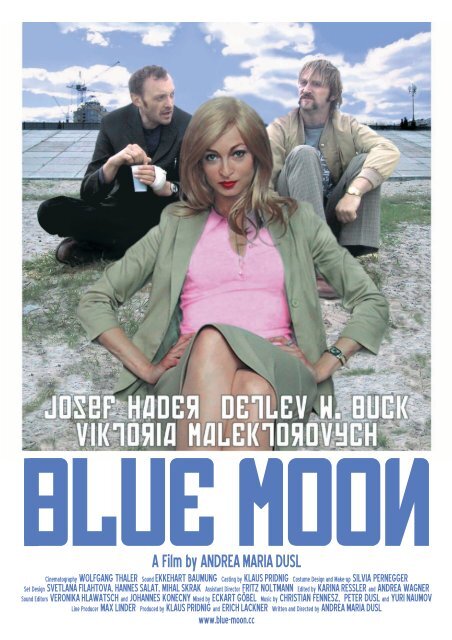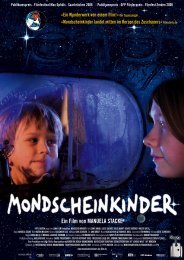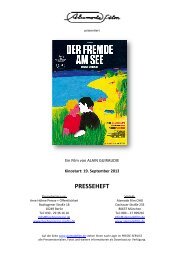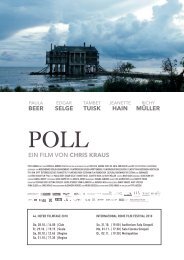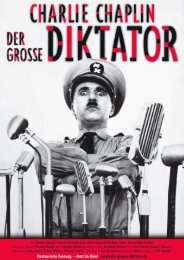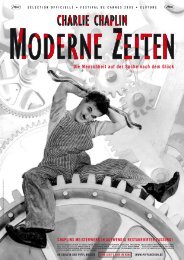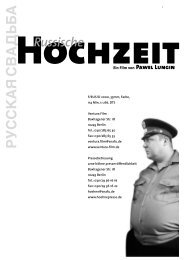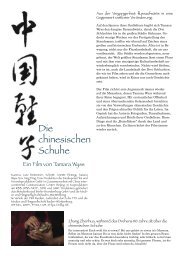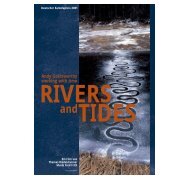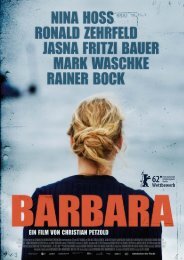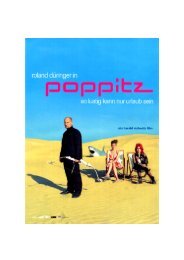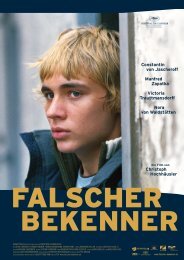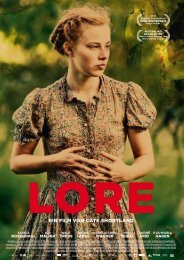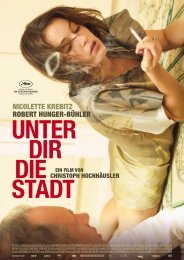Create successful ePaper yourself
Turn your PDF publications into a flip-book with our unique Google optimized e-Paper software.
i8LUE<br />
M00N<br />
A�Film�by�ANDREAMARIADUSL<br />
Cinematography WOLFGANG�THALER��Sound�EKKEHART�BAUMUNG��Casting�by KLAUSPRIDNIG��Costume�Design�and�Make-up SILVIA�PERNEGGER�<br />
Set�Design SVETLANAFILAHTOVA,�HANNESSALAT,�MIHALSKRAK��Assistant�Director FRITZ�NOLTMANN��Edited�by KARINARESSLER�and ANDREA�WAGNER<br />
Sound�Editors VERONIKAHLAWATSCH�and JOHANNES�KONECNY�Mixed�by ECKARTGÖBEL��Music�by CHRISTIAN�FENNESZ,��PETER�DUSL�and YURINAUMOV<br />
Line�Producer MAXLINDER��Produced�by KLAUSPRIDNIG�and ERICHLACKNER��Written�and�Directed�by ANDREAMARIADUSL<br />
www.blue-moon.cc
“Why�don’t�you<br />
call�her?<br />
She�is�a�call�girl,<br />
isn’t�she?”<br />
“Warum�rufst�Du<br />
sie�nicht�an?<br />
Die�kann�man�doch<br />
anrufen!”
5yN0p5i5<br />
When Johnny Pichler turns his back on the safety of the West and<br />
ventures into the far reaches of Eastern Europe, he is following<br />
the summons of love. His route takes him to Slovakia and then on<br />
to Ukraine – and finally to Odessa, the mystic Black Sea port city.<br />
On the run, the stoical money courier flees to Slovakia with<br />
Shirley. Yet before he gets the chance to make even a<br />
fleeting acquaintance, the enigmatic blonde vanishes. Setting off<br />
in search of her, Johnny instead encounters her twin sister Jana.<br />
Then there’s the hapless East German Ignaz, who<br />
keeps turning up in Johnny’s life as he stumbles<br />
from one bizarre predicament to the next.<br />
Shirley frequents hotel rooms in search of her future. Jana, a taxi<br />
driver in the Ukrainian city of Lviv, is held hostage by her own<br />
past and hopes to deal with it by minding a herd of sheep and a<br />
host of secrets. The small-time crook Ignaz, floundering<br />
helplessly in the bewildering post-communist world, has only<br />
money in mind – and friendships which invariably<br />
prove his downfall.<br />
On the run from the snares of intimacy, they all embark on an<br />
odyssey of the emotions which, incompatible with the rules of the<br />
game as it is played in Eastern Europe, continues until the<br />
Blue Moon rises over distant Odessa.<br />
Andrea Maria Dusl’s début feature film is a modern-day tale of<br />
love between East and West; of the quenching of longing and the<br />
discovery of a continent, a road movie set in countries that,<br />
although just next door, for decades concealed their idiosyncrasies<br />
and their whimsicality behind the Iron Curtain.<br />
Es ist die Liebe, die Johnny Pichler vom sicheren Westen tief<br />
in den Osten Europas führt, erst in die Slowakei, dann in die<br />
Ukraine bis nach Odessa, die mystische Hafenstadt am<br />
Schwarzen Meer.<br />
Eine Flucht treibt den stoischen Geldboten Johnny mit der<br />
betörenden Shirley von Österreich in die Slowakei. Bevor<br />
er sie richtig kennenlernen kann, verschwindet die<br />
rätselhafte Frau. Auf der Suche nach ihr findet er nur ihre<br />
Zwillingsschwester Jana. Immer wieder kreuzt der<br />
gestrandete Ostdeutsche Ignaz Johnnys Wege, die fortan<br />
gepflastert sind mit Grotesken, Gefahren und Geliebten.<br />
Es ist die Zukunft, die Shirley in Hotelzimmern sucht und vor<br />
der Liebe davonlaufen lässt. Es ist die Vergangenheit, die<br />
Taxifahrerin Jana im ukrainischen Lviv gefangen hält, Schafe<br />
und Geheimnisse hüten lässt. Es ist das Geld, das den kleinkriminellen<br />
Ignaz durch den Postkommunismus stolpern und<br />
stets aufs Neue an Freundschaften scheitern lässt.<br />
Ein Spiel von Nähe und Flucht schickt alle auf eine Odyssee<br />
der Gefühle, die gegen die Regeln der Welt im Osten prallen,<br />
ehe im fernen Odessa der Blaue Mond aufzieht.<br />
Das Spielfilmdebüt von Andrea Maria Dusl ist ein modernes<br />
Märchen über die Liebe zwischen Ost und West; über die<br />
Erfüllung einer Sehnsucht und die Entdeckung eines<br />
Kontinents. Es ist ein Roadmovie in den unbekannten Osten,<br />
in jene Welt von nebenan, die vom Eisernen Vorhang<br />
versperrt, jahrzehntelang ihr Eigenleben und ihre bizarre<br />
Exotik verborgen hielt.
J0HnnY<br />
Josef�Hader<br />
Johnny�Pichler:<br />
“So,�you�come�from�America?“<br />
Shirley:<br />
“Yes,�something�like�that…“<br />
Johnny�Pichler:<br />
“We�all�come�from�<br />
something�like�that!“�
5Hirley<br />
jAnA<br />
Viktoria<br />
Malektorovych<br />
Jana:�“Ich�frage�mich�oft,�<br />
was�ich�noch�hier�mache…<br />
In�dem�blöden�Haus...�<br />
Und�meine�Schafe?�<br />
Sie�sind�nicht�angebunden,�<br />
sie�könnten�<br />
ganz�leicht�über�den�<br />
Zaun�springen.�<br />
Aber�sie�bleiben�auch�da.”
Jana:�“I�often�ask�myself:�What�am�I�still�doing�here…<br />
in�this�stupid�house...�And�my�sheep?�<br />
They�aren’t�tied�up,�they�could�easily�jump�over�the�fence<br />
and�run�away.�But�even�they�stay�here.”
“Ich�hatte�auch�mal�Eine...<br />
Aber�die�mochte�mich�nicht,�<br />
weil�ich�immer�<br />
weisse�Schuhe�angehabt�habe.�<br />
Das�war�die�Tochter�<br />
vom�Direktor�von�<br />
Plaste�und�Elaste”
IgNAZ<br />
Detlev�W.�Buck<br />
“I�liked�a�girl�too�once.�<br />
But�she�didn’t�like�me,�because�<br />
I�always�wore�white�shoes.<br />
She�was�the�daughter�of�the�boss�of�Plaste�and�Elaste.”
“You’re looking for my<br />
sister? My sister<br />
isn’t here…”<br />
“Meine Schwester<br />
suchst du?<br />
Meine Schwester ist<br />
nicht hier…“<br />
INTERVIEW<br />
with�Andrea�Maria�Dusl��<br />
The film begins and ends with the moon in the sky – like the anchors of an arch<br />
spanning the whole film. What do these two full moons signify?<br />
In the English-speaking world there’s the saying “once in a blue moon” – a blue moon<br />
being a second full moon in a single month. That’s a phenomenon which turns up very<br />
seldom in the lunar calendar, so the phrase denotes something which rarely occurs –<br />
only once in a blue moon. Like love. The lyrics of the song<br />
“Blue Moon” say the same thing:<br />
Blue moon, you saw me standing alone<br />
Without a dream in my heart, without a love of my own...<br />
That song summarises the story-line of the film.<br />
Was it the song which gave you the idea for the film?<br />
I spent months, in fact years, looking for a second-hand copy of the record. Then something<br />
magic happened on my first visit to Odessa. I’d got into the habit of going into<br />
record shops wherever I went in search of music I was looking for. One of the pieces I<br />
always asked for was Julie London singing “Blue Moon”. In February 1996 I walked<br />
into a small electrical appliances shop in Odessa and inquired – like so many times<br />
before – whether they also sold music. The man pulled out a drawer, which contained<br />
a single cassette: songs by Julie London which he’d recorded himself.<br />
Song number 14 was “Blue Moon”. That’s when I learned that<br />
there’s no such thing as coincidences.<br />
What was it that fascinated you about Eastern Europe from the start?<br />
Our generation grew up thinking of the East as the “Evil Empire”. There was the Iron<br />
Curtain, and everything behind that was communism and missiles and it was all very<br />
threatening. Then the Iron Curtain disappeared in 1989, and suddenly you could go<br />
over there without a visa. On the very first day we drove to Bratislava. It was a rainy,<br />
foggy November day, and the world we discovered – ugly though it may have been –<br />
was very romantic: full of people with their hearts throbbing with longings and<br />
dreams. It was a world I’d never even known existed. We decided right away to keep<br />
going back, and each time we ventured a bit further into the East. It was a thrilling<br />
experience to be exploring a totally different world. I just had to make a film about it!<br />
About the discovery of this other world.<br />
“Blue Moon” is a love story, but it’s also a road movie. Why did<br />
you want to make a film about being on the move?<br />
My idea was to depict an odyssey, the rediscovery of the<br />
continent. So I put the hero in a car and told him<br />
to go East, young man.<br />
The film can be understood at various levels. There’s the literal<br />
narrative: the love story. And there’s a symbolic level,<br />
pointing to relations between East and West…<br />
There are no symbolic relations between East and West. The love<br />
story between Jana and Johnny is a metaphor for the very downto-earth<br />
way the East relates with the West. It’s a story about<br />
longing and fear, appraisal and misappraisal, the status quo and<br />
change. So it’s actually the other way round: the love story is the<br />
symbol, and reality is the literal narrative.<br />
Another symbol: the bottle with the dancing ballerina enclosed in it.<br />
It keeps turning up in the film. Is this a symbol of Eastern Europe?<br />
Yes, it’s a symbol of Jana, who in turn symbolises the East. Jana is a prisoner of her<br />
own biography. She can’t get out, although the bottle is open. She may keep on dancing<br />
in her beautiful red gown, but she stays put where she is.<br />
Are you suggesting that the East needs the West to liberate it?<br />
No, I’m saying that we in the West think the East needs us to liberate it.<br />
Jana lost her family in a ferry accident. The day when the ship went down was the<br />
very same day that the Iron Curtain was toppled. Why? Have you hidden away any<br />
more allusions to events in Eastern Europe?
The sinking of the ferry stands for the collapse of communism. What happened in 1989<br />
was not just that people emancipated themselves from oppression; they also lost their<br />
history. An entire world vanished without trace. The room which Johnny<br />
discovers on his first day in Jana’s apartment is a relic of that vanished world:<br />
the red flags, the bust of Lenin, the dummy missile on the wall…<br />
You include a visual quotation of the famous flight of steps from Eisenstein’s<br />
“Battleship Potemkin” in the opening sequence …<br />
I realised those steps would have to be in there. Everybody knows them, because that’s<br />
where Sergei Eisenstein shot his famous scene with the pram, the soldiers and the<br />
citizens of Odessa in 1925. I stripped the<br />
steps down to what they are in essence: a<br />
way of going from the top to the bottom.<br />
When Jana goes down the steps, it’s as if<br />
she is crossing a frontier. The image of the<br />
empty steps in Odessa has<br />
supplanted the pictures of the Iron<br />
Curtain in my mind.<br />
Is that why you chose Odessa as<br />
a location?<br />
The idea behind my choice of Odessa was<br />
to find a place that marks the end and the<br />
beginning of the world. A place which has<br />
a harbour, so you can’t go any further<br />
without taking a ship or jumping into the<br />
water. It isn’t a coincidence that the city<br />
owes its name to Homer’s Odyssey. The<br />
Argonauts are said to have gone on land<br />
there, and when Catherine the Great<br />
founded Odessa in the eighteenth century,<br />
it was given a name that alludes<br />
to its mythical associations.<br />
To what extent is the plot based<br />
on true stories?<br />
A lot of real-life episodes that I was told<br />
about while I was researching the film have found their way into the screenplay. The<br />
incident with the brick, for instance, and the story of the teacher and her little girl. And<br />
then I found a lot of stories in the Internet.<br />
There’s another formal level in “Blue Moon”: that of the video sequences. Johnny<br />
Pichler, who’s not a big talker, uses the medium of video as an alternative language.<br />
Where did this idea come from?<br />
I gave him this miniature camera so he could discover that a medium he didn’t know<br />
could also serve as a language: the medium of the film. At first he starts using the<br />
camera randomly. He captures reality without viewing it in a wider context. At the<br />
end, in the last video sequence, we see how he perceived the world.<br />
Christian Fennesz’s film score is like a third narrative strand. How important was the<br />
soundtrack for you?<br />
Extremely important. I didn’t want anything with a folklore ring to it in the film.<br />
Christian Fennesz writes urban music. It’s as rootless as the characters on the screen –<br />
always on an invisible journey, like Fennesz himself, who’s constantly on the move<br />
between Paris, Tokyo and New York. I worked at least as closely with him as with the<br />
acting cast. I owe another musical level to Yuri Naumov, the famous Russian blues<br />
guitarist. He works quite differently from Fennesz and his technique of conjuring up<br />
samples on an Apple notebook. I first heard Naumov’s unmistakable guitar playing<br />
during breakfast in our Kiev hotel while we were shooting on location there. My<br />
brother Peter Dusl contributed another part of the score. Being brother and sister,<br />
we manage to work together without using language at all.<br />
There’s a whole jumble of languages in the film, with people talking in their mother<br />
tongues: Ukrainian, Russian, Slovakian, English … Why did you want that?<br />
Because that’s the way it is. I wanted the film to include things which we can’t<br />
understand; I wanted some of the language to be registered not in terms of its<br />
message but as musical sounds. We’re completely inundated with intelligibility the<br />
whole time: films are always being translated or subtitled. But life isn’t like that.<br />
If you drive just fifty miles East from Vienna, you can’t understand a word that’s<br />
being said. Words might mean anything, and the misunderstandings that arise from<br />
not understanding are the seasoning in the soup of our memories.<br />
Is that why you wanted a Ukrainian actress for the main female role?<br />
You’ve got a big sign<br />
round your neck,<br />
and in block capitals it<br />
says: ‘Looking for<br />
good time!’<br />
„Sie haben ein<br />
unsichtbares Schild<br />
umgehängt.<br />
Da steht in grossen<br />
Buchstaben drauf:<br />
‘Will was erleben!’“
“Let’s go away<br />
somewhere together,<br />
Jana!”<br />
“Lass uns irgendwo<br />
hinfahren, Jana!“<br />
We did casting sessions in Kiev, and I looked at the tapes in Vienna. Viktoria<br />
Malektorovych turned out to be a phenomenal personality. She has a breath-taking<br />
charisma and a combination of fragility and strength which is exactly what the role<br />
calls for. She learnt to speak German – and even to drive a car – specially for the part.<br />
You spent twelve years working on “Blue Moon”. Why did it take so long to finish?<br />
My original plan was to tell a story in instalments. I was going to finance each instalment<br />
privately and have it screened in<br />
cinemas like commercials. I actually shot<br />
six of these instalments, each two minutes<br />
long, on 35 millimetre film. The project<br />
was called “Around the World in Eighty<br />
Days”, although it had nothing to do with<br />
Jules Verne. What I wanted to do was<br />
simply to tell eighty short stories. Then I<br />
began to realise that I’d have<br />
to take a different approach. So<br />
I amalgamated the stories in a single plot,<br />
and that was how “Blue Moon” came<br />
about. It took a while before I found my<br />
producer, Erich Lackner, who was willing<br />
to make the film with me.<br />
Nobody else had the courage.<br />
You studied stage design, now you’re a<br />
graphic artist and write a newspaper<br />
column. That’s a long way round to get to<br />
a career as a film director.<br />
My interest in filmmaking started when I<br />
was fifteen. All the other things came later.<br />
Let me put it this way: being able to draw<br />
and write stand you in good stead<br />
when you’re making a film.<br />
What was the biggest problem you encountered while you were<br />
shooting the film?<br />
Shooting it was like trying to swim in liquid concrete. For the people standing at the side<br />
of the pool it must have looked pretty bizarre. But you try swimming elegantly in a pool<br />
full of concrete! The further reality diverged from my ideas, the thicker the concrete got.<br />
Film-making is the the most exhausting form of self-realisation humanity has ever<br />
invented. It’s definitely the most expensive! (Laughter) What made things a bit<br />
easier for me was that we had rehearsed extensively and shot the scenes in<br />
chronological order. That made it more spontaneous. We didn’t have to worry about<br />
words so we could work on other things. It was a bit like a travelling circus: the same<br />
show but never the same place, so it was always a different show in the end.<br />
How important are the locations and the whole visual feel of a film?<br />
The locations are a key factor. In the course of my travels in Eastern Europe I started to<br />
get an ever clearer idea of how reality would have to look if it was to match my own<br />
image of reality. I even had original settings completely worked over so that they looked<br />
the way they had done when I first saw them. One of the film’s mainstays was my<br />
cameraman Wolfgang Thaler – and I don’t mean just the aesthetic aspects. His hand-held<br />
camera work is so steady that you often don’t realise it’s hand-held.<br />
It seems to breathe with the people and the space.<br />
I don’t recall having seen Josef Hader so serious, so minimalist. He’s associated in most<br />
people’s minds with the cabaret film. Why did you cast him for the male lead?<br />
Because I had the feeling that Josef Hader would be Johnny Pichler. Just that. My<br />
intuition turned out to be right. Josef Hader was exactly the Johnny Pichler I’d invented<br />
in my head years before. Coming to terms with this character stretched us both to our<br />
limits. In the end I had the feeling Josef wasn’t Josef<br />
but the identity which had taken him over.<br />
So you didn’t set out expressly to make a cabaret film?<br />
I don’t even know what that is.<br />
Detlev Buck is another high-powered comic figure …<br />
... for a tragic character. Ignaz Springer is an East German who got stuck in the East the<br />
way it was. I had Detlev Buck on my wish list for this part almost from the start. To get<br />
him on board we did a three-day trial shooting with him and Josef Hader in Kiev. He<br />
liked the vodka, he liked Ukraine. And I think he also liked the screenplay.<br />
“Blue Moon” is an unashamedly romantic film with a happy ending.<br />
Do you believe in happy endings? In real life too?<br />
Yes.
INTERVIEW<br />
mit�Andrea�Maria�Dusl<br />
Ein Mond steht am Anfang und am Ende des Films am Himmel wie eine formale<br />
Klammer. Wofür stehen die beiden Vollmonde?<br />
Es gibt im angloamerikanischen Sprachraum den Mythos des “Blue Moon”. So ein<br />
“Blauer Mond” ist der zweite Vollmond in einem Monat. Weil dieses kalendarische<br />
Phänomen nur alle heiligen Zeiten auftritt, bezeichnet man mit damit auch andere<br />
Seltenheiten. Wenn etwas sehr selten ist, ist es so rar wie ein Blue Moon.<br />
Die Liebe ist so ein rares Phänomen. Es ist wie in dem berühmten Song “Blue Moon”:<br />
Blue moon, you saw me standing alone<br />
Without a dream in my heart,<br />
without a love of my own...<br />
Das Lied ist die Story meines Films.<br />
War das Lied die Idee zum Film?<br />
Ich habe viele Monate, ja Jahre versucht, diese Platte antiquarisch zu finden.<br />
Vergeblich. Bei meiner ersten Reise nach Odessa ist etwas Magisches passiert. Ich war<br />
ja konditioniert darauf, bei jeder sich bietenden Gelegenheit in Plattengeschäfte zu<br />
gehen, um nach Musik zu suchen. Immer war die Frage nach “Blue Moon” von Julie<br />
London dabei. In einem kleinen Elektrogeschäft in Odessa, im Februar 1996, fragte ich<br />
also wie so oft, ob sie Musik hätten. Darauf öffnete er eine Lade. Darin lag, ich konnte<br />
es nicht fassen, eine einzelne Cassette. Es waren Songs von Julie London, selbst aufgenommen.<br />
Der 14te Song war “Blue Moon“. Seither weiss ich, dass es keine Zufälle gibt.<br />
Was hat Dich am Osten von vornherein so fasziniert?<br />
Unsere Generation ist aufgewachsen in dem Bewusstsein, dass da drüben im Osten<br />
das Reich des Bösen ist. Da war der Eiserne Vorhang und dahinter der Kommunismus<br />
und die Raketen, und alles war gefährlich. Als 1989 der Eiserne Vorhang fiel, war es<br />
blitzartig möglich, ohne Visum hinüberzufahren. Am ersten Tag fuhren wir nach<br />
Bratislava, es war November, regnerisch und neblig und in ihrer ganzen Hässlichkeit<br />
war das eine sehr romantische Welt voller Menschen, die<br />
Sehnsüchte und Paradiese in ihren Herzen hatten, von denen ich<br />
nie auch nur etwas geahnt hatte. Wir beschlossen, sofort wieder<br />
zu fahren, jedes Mal ging es weiter in den Osten. Es war<br />
aufregend, eine völlig andere Welt zu entdecken. Darüber<br />
musste ich einen Film machen! Über die Entdeckung<br />
dieser anderen Welt.<br />
„Blue Moon“ ist eine Liebesgeschichte, aber auch ein<br />
Roadmovie. Was hat dich daran interessiert, einem Film über<br />
Fortbewegung zu machen?<br />
Ich wollte eine Odyssee erzählen, die Wiederentdeckung unseres<br />
Kontinents beschreiben. Ich habe meinen Helden in ein Auto<br />
gesetzt und auf die Reise in den Osten geschickt.<br />
Der Film hat mehrere erzählerische Ebenen: Die konkrete der<br />
Liebesgeschichte und eine symbolische der Beziehungen<br />
zwischen Ost und West…<br />
Ost und West haben keine symbolischen Beziehungen. Die Liebesgeschichte von Jana<br />
und Johnny ist die Metapher für die sehr konkrete Beziehung des Ostens mit dem<br />
Westen. Eine Geschichte von Sehnsucht und Angst, von Urteilen und Vorurteilen,<br />
Stillstand und Veränderung. Es ist also genau umgekehrt. Die Liebesgeschichte ist das<br />
Symbol und die Realität das Konkrete.<br />
Bleiben wir bei der Symbolik: In dem Film spielt eine Flasche, in der eine tanzende<br />
Ballerinapuppe eingesperrt ist, eine wichtige Rolle. Ist sie ein Symbol für den Osten?<br />
Ja, sie ist ein Symbol für Jana, die wiederum ein Symbol für den Osten ist. Jana ist eine<br />
Gefangene ihrer eigenen Geschichte... Sie kann nicht raus, obwohl die Flasche offen ist.<br />
In ihrem schönen roten Kleid tanzt sie auf der Stelle.<br />
Heißt das der Osten braucht den Westen zu seiner Befreiung?<br />
Nein, es heißt der Westen glaubt, der Osten brauche ihn dazu.<br />
Das Datum des Fährenunglücks bei dem Jana ihre Familie verliert, ist genau das<br />
Datum des Niedergangs des Eisernen Vorgangs? Warum? Und gibt es noch mehr<br />
“That’s my sister.<br />
What have you<br />
done to her?”<br />
„Das ist meine<br />
Schwester, was<br />
haben Sie mit ihr<br />
gemacht?“
“Which is the best<br />
hotel in Odessa?”<br />
“The best? I<br />
wouldn’t know.<br />
I only know the<br />
Chernomore …<br />
It isn’t too bad …”<br />
„Wie heisst das<br />
beste Hotel in<br />
Odessa?“<br />
„Das beste?“ Das<br />
beste kenn ich<br />
gar nicht.<br />
Ich kenn nur das<br />
Chernomore...<br />
das ist nicht<br />
schlecht...“<br />
versteckte Anspielungen auf die Geschichte des Ostens?<br />
Der Untergang der Fähre ist der Untergang des Kommunismus. Die Menschen haben<br />
sich 1989 nicht nur von Unterdrückung befreit, sie haben auch ihre Geschichte verloren.<br />
Eine ganze Welt ist für immer untergegangen. Das Zimmer, das Johnny an seinem<br />
ersten Tag in Janas Haus entdeckt, ist ein Teil dieser untergegangenen Welt:<br />
Die roten Fahnen, die Leninbüste, das Raketenmodell an der Wand.<br />
Die berühmte Treppe aus Eisensteins “Panzerkreuzer Potemkin“ hast<br />
Du gleich am Anfang auch zitiert…<br />
Mir war klar, dass ich die Treppe nicht auslassen konnte.<br />
Jeder kennt sie, weil Sergej Eisenstein 1925 dort seine<br />
berühmte Szene mit dem Kinderwagen, den Soldaten<br />
und Bürgern von Odessa gedreht hat. Ich hab die Treppe<br />
auf das reduziert, was sie ist: Eine Verbindung von oben<br />
nach unten. Wenn Jana hinuntergeht, dann ist das wie<br />
das Überschreiten einer Grenze. Für mich hat das Bild<br />
der leeren Treppe von Odessa die Bilder<br />
vom Eisernen Vorhang abgelöst.<br />
Fiel deshalb die Wahl auf Odessa?<br />
Hinter Odessa steht die Idee, einen Punkt zu finden, der<br />
das Ende und Anfang der Welt markiert. Ein Ort, wo ein<br />
Hafen ist, wo man nicht mehr weiter kann, ohne ein<br />
Schiff zu nehmen oder ins Meer zu springen. Es ist kein<br />
Zufall, dass der Name der Stadt an Homer’s Odyssee<br />
erinnert. Hier sollen die Argonauten an Land gegangen sein, und also wurde die<br />
Stadt, als sie im 18ten Jahrhundert von Katharina der Grossen gegründet wurde, in<br />
Anspielung auf diese mythische Dimension Odessa genannt.<br />
Inwieweit basiert “Blue Moon” auf wahren Geschichten?<br />
Es sind viele echte, erlebte Geschichten, die mir Menschen auf meinen Recherchereisen<br />
erzählt haben, ins Drehbuch eingeflossen. Die Ziegelstein-Geschichte ist eine wahre<br />
Geschichte und auch die von der Lehrerin mit ihrem kleinen Mädchen. Ich hab auch im<br />
Internet noch sehr viele Geschichten gefunden.<br />
Formal gibt es in “Blue Moon“ auch eine Videoebene. Ihr bedient sich Johnny Pichler,<br />
der sonst eher wortlos ist, als Sprache. Wie bist Du auf diese Idee gekommen?<br />
Mit dieser kleinen Kamera wollte ich ihm ein Mittel geben, von dem er gar nicht<br />
gewusst hat, dass es auch eine Art von Sprache ist: Das Medium Film. Er benützt die<br />
Kamera am Anfang ganz zufällig. Er fängt Wirklichkeit ein, ohne dass er sie in<br />
größerem Zusammenhang sieht. Am Schluss, in der letzten Videosequenz sehen wir,<br />
wie er die Welt wahrgenommen hat.<br />
Die Filmmusik, komponiert von Christian Fennesz, ist sowas wie eine dritte<br />
erzählerische Ebene? War Dir der Soundtrack besonders wichtig?<br />
Extrem wichtig. Ich wollte keine folkloristische Musik im Film haben. Christian<br />
Fennesz macht urbane Musik. Sie ist entwurzelt wie die Figuren im Film, auf einer<br />
unsichtbaren Reise, wie er selbst, der zwischen Paris, Tokio und New York pendelt. Die<br />
Zusammenarbeit mit ihm war mindestens so intensiv, wie die Arbeit mit den<br />
Schauspielern. Eine andere Musikebene hat mir der berühmte russische Bluesgitarrist<br />
Yuri Naumov erzeugt. Er arbeitet völlig anders als Fennesz mit seinem, auf einem<br />
Apple Laptop verzauberten Samples. Sein unverwechselbares Gittarenspiel habe ich<br />
während der Dreharbeiten beim Frühstück in unserem Kiever Hotel zum ersten mal<br />
gehört. Einen Teil der Score Music hat mein Bruder Peter Dusl gemacht. Weil wir<br />
Geschwister sind, sind wir beim Arbeiten völlig ohne Worte ausgekommen.<br />
Im Film herrscht ziemliches Sprachengewirr. Die Menschen sprechen Originalsprache:<br />
Ukrainisch, Russisch, Slowakisch, Englisch. Warum war dir das wichtig?<br />
.<br />
Weil es die Wirklichkeit wiederspiegelt. Ich wollte, dass es Dinge gibt, die man nicht<br />
versteht, ich wollte eine Sprachebene, die man nicht als Inhalt wahrnimmt sondern als<br />
Musik. Wir sind völlig überspachtelt mit Dauerverständnis, alles wird ununterbrochen<br />
übersetzt oder untertitelt. Das Leben ist ja gar nicht so. Wenn wir nur 80 Kilometer<br />
nach Osten fahren, verstehen wir nichts mehr, alles kann alles bedeuten und die<br />
Missverständnisse, die sich aus dem Nichtverstehen ergeben, sind das<br />
Salz in der Suppe unserer Erinnerungen.<br />
Hast Du deshalb nach einer ukrainischen Hauptdarstellerin gesucht?<br />
Wir haben Castings in Kiew gemacht. Ich habe die Bänder in Wien angesehen. Viktoria<br />
Malektorovych war ein singuläres Naturereignis. Sie hatte eine Präsenz, die atemberaubend<br />
war. Sie hat gleichzeitig Zerbrechlichkeit und Kraft, das war die Kombination,<br />
die diese Figur gebraucht hat. Für “Blue Moon” hat sie Deutsch,<br />
ja sogar Autofahren gelernt.<br />
Du hast zwölf Jahre an dem Projekt gearbeitet, bis Du es<br />
realisieren konntest. Wieso hat es so lange gedauert?
Ursprünglich hatte ich die Geschichte in Fragmenten geplant. Jedes davon wollte ich<br />
privat finanzieren und wie Werbespots ins Kino bringen. Ich habe sechs solcher Folgen<br />
tatsächlich gedreht: Jeweils zwei Minuten lang, auf 35 mm. Das Projekt hieß „In 80<br />
Tagen um die Welt.“ Mit Jules Verne hatte das aber nichts zu tun, ich wollte einfach<br />
80 kleine Geschichten erzählen. Bis mir bewusst wurde, dass ich einen anderen Weg<br />
gehen musste. Ich packte die Geschichten alle in eine, und so entstand “Blue Moon”.<br />
Es hat ein bisschen gedauert, bis ich Erich Lackner, meinen Produzenten, gefunden<br />
habe, der mit mir diese Geschichte realisieren wollte. Die anderen hatten nicht<br />
genug Mut dazu.<br />
Du hast Bühnenbild studiert, bist Zeichnerin und Kolumnistin. Wieso hat Deine<br />
Filmlaufbahn solche Umwege genommen?<br />
Ich habe mit Film begonnen, als ich 15 war. Alles andere kam erst später dazu. Wollen<br />
wir es mal so sagen: Zeichnen und Schreiben sind Dinge, die man beim<br />
Filmemachen ganz gut brauchen kann.<br />
Was war für Dich das Schwierigste bei den Dreharbeiten?<br />
Das Drehen war wie Schwimmen in flüssigem Beton. Für die Menschen am<br />
Beckenrand sieht das vielleicht komisch aus. Aber schwimm Du mal schönen Stil in<br />
einem Zementbecken! Der Beton war umso dicker, je mehr die Wirklichkeit von<br />
meinen Idealen abwich. Film ist vermutlich die anstrengendste Selbstverwirklichung,<br />
die die Menschheit hervorgebracht hat. Die teuerste in jedem Fall. (lacht…) Leichter hat<br />
es mir gemacht, dass wir extensive Proben hatten und chronologoisch gedreht haben.<br />
Wir haben beim Drehen nicht mehr nach Worten, sondern nach etwas anderem<br />
gesucht. Es hatte etwas von Wanderzirkus, die gleiche Show an verschiedenen Orten<br />
aufzuführen, und wie beim Zirkus war es dann immer eine andere Show.<br />
Wie wichtig sind für Dich die<br />
Schauplätze des Films und der Look?<br />
Die Schauplätze sind essentiell. Bei<br />
meinen Reisen in den Osten habe ich<br />
immer konkretere Vorstellungen<br />
davon entwickelt, wie die Wirklichkeit<br />
aussehen muss, um meinem Bild der<br />
Wirklichkeit zu entsprechen. Das ging<br />
so weit, dass ich Originaldekors völlig<br />
umbauen liess, damit sie wieder so<br />
aussahen, wie bei meinen ersten<br />
Besuchen. Einer der Eckpfeiler des<br />
Films war der Kameramann Wolfgang<br />
Thaler und nicht nur was die Ästhetik<br />
betrifft. Seine Handkamera ist so<br />
ruhig, dass man sie oft gar nicht als<br />
Handkamera wahrnimmt. Sie atmet<br />
mit den Menschen und mit<br />
den Räumen.<br />
Selten hat man Josef Hader so ernst,<br />
so minimalistisch gesehen. Warum<br />
hast du ihn, der ja sonst für den<br />
Kabarettfilm steht, besetzt?<br />
Ich hatte bei Josef Hader das Gefühl,<br />
er würde Johnny Pichler sein. Nicht<br />
mehr und nicht weniger. Dieses Gefühl hat mich nicht betrogen. Josef Hader war<br />
genau der Johnny Pichler, den ich mir Jahre zuvor ausgedacht hatte. Die Konfrontation<br />
mit dieser Figur hat uns beide sehr gefordert. Am Ende habe ich Josef nicht mehr als<br />
Josef wahrgenommen, sondern als die Figur des Johnny, die in ihn geschlüpft ist.<br />
Du wolltest also explizit keinen Kabarettfilm machen?<br />
Ich weiss gar nicht, was das ist.<br />
Detlev Buck ist ein weiteres komödiantische Kaliber...<br />
... für eine tragische Figur: Ignaz Springer ist ein Ostdeutscher ist, der im ehemaligen<br />
Osten hängengeblieben ist. Detlev Buck ist für diese Rolle sehr früh auf meiner<br />
Wunschliste gestanden. Um ihn an Bord zu bekommen, haben wir einen dreitägigen<br />
Testdreh mit ihm und Josef Hader in Kiev gemacht. Der Wodka war gut, die Ukraine<br />
gefiel ihm. Und das Drehbuch, glaube ich, mochte er auch.<br />
Blue Moon ist ein hochromantischer Film mit Happy End…<br />
Glaubst du an das Happy End? Auch im Leben?<br />
Ja.<br />
Blue moon,<br />
you saw me standing alone<br />
Without a dream in my heart,<br />
without a love of my own<br />
Blue moon,<br />
you knew just what I was<br />
there for<br />
You heard me saying a prayer<br />
for someone I really could<br />
care for<br />
And then suddenly appeared<br />
before me, the only one<br />
my arms could ever hold…
Blue�Moon would never have been made had it not been for Erich<br />
Lackner, a producer with all the intrepid courage that he used to bring<br />
to free climbing. He put together a team of film-makers who helped me<br />
breathe life into ”Blue Moon”. My heartfelt thanks goes to them all.<br />
Klaus Pridnig, who worked closely with me from the earliest screenplay<br />
versions onwards, spent months looking for the ideal Jana and for the<br />
houses, streets and people that would make up her environment. He<br />
found not only all those things but much more besides. His unflappable<br />
professionalism and craftsmanship offset my own insecurity. Line<br />
producer Max Linder lavished painstaking care on every detail of this<br />
nerve-testing undertaking. During many a night in Ukraine he lent me<br />
his support, encouraged me and helped me to regain my flagging<br />
spirits. First Assistant Director Fritz Noltmann managed to keep us on<br />
track however rough the going got.<br />
Cinematographer Wolfgang Thaler transformed ”Blue Moon” into a<br />
thrilling visual experience. The film owes him an endless debt of<br />
gratitude for the subtle warmth of his lighting, the natural breath of his<br />
work with the hand-held camera, and his eye’s delighted response to<br />
visual pleasure. Our sound recordist, Ekkehart Baumung, came up with<br />
simply the most exciting soundtrack I’ve ever heard. Attila Boa,<br />
metaphysicist, philosopher and Assistant Cameraman, contributed<br />
his truly magical quality of impeccable precision. Silvia Pernegger<br />
decked “Blue Moon” out in incredibly authentic costumes.<br />
Christian Fennesz composed a soundtrack of hypnotic sophistication,<br />
while his fellow musicians Yuri Naumov and Peter Dusl provided<br />
disturbingly beautiful songs. Editor Karina Ressler drew on a wealth of<br />
perspicacity and intuitive aptitude in sensing where the film’s true story<br />
lies and making my dream come true on the screen.<br />
Andrea Maria Dusl<br />
THE MAKING 0F<br />
Cinematographer Wolfgang Thaler,<br />
Director Andrea Maria Dusl,<br />
Actor Josef Hader and<br />
Producer Klaus Pridnig durcing a<br />
rehearsal of Blue Moon<br />
(from left to right)<br />
Andrea�Maria�Dusl<br />
Director�and Screenplay�Writer<br />
Born in Vienna in 1961, the daughter<br />
of an Austrian architect and a<br />
Swedish mother from a<br />
sea-faring family.<br />
She attended the Master Class in<br />
Stage Design at the Vienna Fine Arts<br />
Academy, acquiring her Magistra<br />
Artium degree in 1985. She then<br />
accepted engagements as stage<br />
designer and production assistant<br />
at various Austrian theatres.<br />
From 1985 onwards Andrea Maria<br />
Dusl has written and illustrated<br />
regularly for Austrian print media.<br />
In 1996 she began writing a weekly<br />
column for the famous Viennese<br />
arts & current affairs journal Falter.<br />
Films (director and screenplay writer)<br />
Blue�Moon<br />
Feature film / 90 min. / col. / Austria 2002<br />
Tour�du�Monde�en�Quatrevingt�Jours<br />
6 short films, 12 min. / b/w / Austria, 1991
Josef�Hader<br />
Johnny�Pichler<br />
The stoical money courier follows the<br />
summons of love as he ventures into the<br />
far reaches of Eastern Europe.<br />
Viktoria�Malektorovych<br />
Shirley/Jana�<br />
The enigmatic Ukrainian taxi driver,<br />
held hostage by her own past, is<br />
searching for her future in hotel rooms.<br />
Detlev�Buck<br />
Ignaz<br />
The small-time crook from East Germany,<br />
floundering helplessly in the bewildering<br />
post-communist world.<br />
Austria’s best-known cabaret star was born on February 14,<br />
1962 in Waldhausen, Austria. He collected his first cabaret<br />
material during his years at an Episcopal boys’ boarding<br />
school and soon focused on his talent as a comedian. The now<br />
legendary tragicomedy ”Indien” (with Alfred Dorfer) marked<br />
his breakthrough. ”Indien” was filmed in 1993 with himself in<br />
the leading role and became one of the most popular Austrian<br />
films. With his subsequent plays ”Im Keller” (1993), ”Privat”<br />
(1994) and the Austrian blockbuster ”Komm, süsser Tod” aka<br />
”Come Sweet Death” (2000) he became one of the most<br />
successful and most respected comedians in Austria.<br />
Films<br />
Blue�Moon�2002<br />
Komm�süsser�Tod�2000<br />
Der�Überfall�2000<br />
Indien�1993<br />
www.hader.com<br />
Born in Enakievo, Ukraine in 1972. Studied at Kiev<br />
Drama School. One of the most popular Ukrainian<br />
actresses, she has appeared in films and a number of TV<br />
entertainment series. In addition to her screen career,<br />
Viktoria Malektorovych also works as a presenter on<br />
radio and television.<br />
Films<br />
Blue�Moon�2002<br />
Shoes�from�America�2001<br />
The�Undefeated�2000<br />
Hi�Everybody!�1999<br />
Two�Julias�1998<br />
Seventh�Route�1996<br />
Born in Bad Segeberg (Schleswig-Holstein, Germany) in 1962.<br />
The famous German actor and director grew up on his<br />
parents’ farm in Nienwohld near Hamburg. He followed his<br />
schooling and civilian service with an agricultural<br />
apprenticeship. His rural upbringing provided the<br />
background and material for his first films. “Männerpension”<br />
aka “Jailbirds”, which he directed in 1996, became one of the<br />
most successful German films of the nineties.<br />
Directed (and starred in)<br />
Liebesluder�2000<br />
Liebe�Deine�Nächste!�1998<br />
Männerpension�1996<br />
Wir�können�auch�anders�1993<br />
Karniggels�1991<br />
www.bojebuck.com<br />
Acted in<br />
Blue�Moon�2002<br />
Der�grosse�Bagarozy�1999<br />
Sonnenallee�1999<br />
Aimee�und�Jaguar�1998
WOLFGANGTHALER�Cinematography<br />
Born in Möllbrücke in1958. Has worked since 1988 as Lighting<br />
Cameraman for feature films, TV productions, documentaries and news.<br />
Worked with directors Ulrich Seidl and Michael Glawogger<br />
EKKEHARTBAUMUNG�Sound<br />
Born in Graz in 1948. Recorded sound in numerous films<br />
by Werner Herzog, Michael Glawogger and Ulrich Seidl.<br />
KLAUS�PRIDNIG�Producer<br />
Born in Klagenfurt in 1967. Assistant Director, Casting, Producer. Screenplay<br />
and drama consultant. Worked with directors Barbara Albert, Glawogger and Seidl.<br />
KARINARESSLER�Editor�<br />
Born in Villach in 1957. Has edited films by directors Ulrich Seidl,<br />
Barbara Albert, Michael Glawogger, Susanne Derflinger and Paulus Manker.<br />
MAXLINDER�Line�Producer<br />
Born in Vienna in 1951. Screenplay writer, director and line producer.<br />
Has written and direted his own films and worked with<br />
directors Seidl, Glawogger and Albert.<br />
CHRISTIANFENNESZ�Film�Score<br />
Born in Vienna in 1962, is a leading exponent of electronic music in France, the UK,<br />
Japan and the US. He made his name internationally with “hotel paral.lel”. His album<br />
“endless summer”, issued in 2001, earned him world-wide critical acclaim.<br />
Major international music magazines put it at the top of their annual playlist ratings.<br />
PETERDUSL�Score�and�Songs<br />
Born in 1966. Works as a senior graphic designer and as composer of dancefloor,<br />
house and funky-groovy signature tunes for Austrian Television.<br />
He has issued various highly acclaimed albums.<br />
YURI�NAUMOV�Songs<br />
Born in 1964 in Siberia. Ranks as Russia’s foremost blues guitarist. “Guitar World” and<br />
the “New Yorker” have acclaimed him as a “one-man band” that sounds “as if three<br />
guitarists were playing at once”. Forced to give up his studies by the KGB,<br />
Naumov first moved to St. Petersburg and Moscow before emigrating to the USA.<br />
He now lives and works in Brooklyn, NYC.<br />
LOTUS-FILM�Production�Company<br />
Founded by Erich Lackner in<br />
1982, this production<br />
company has emerged as<br />
Austria’s foremost producer<br />
of art house films and<br />
cinema documentaries.<br />
Lotus-Film presented<br />
Barbara Albert’s “Nordrand“<br />
in 1999. Other milestones in<br />
the company’s history:<br />
Michael Glawogger’s<br />
internationally acclaimed<br />
“Megacities”, Goran Rebic’s<br />
“Yugofilm”, and the films<br />
“Tierische Liebe” and “Mit<br />
Verlust ist zu rechnen” by<br />
award-winning Austrian<br />
director Ulrich Seidl. Lotus-<br />
Film was also a partner in<br />
the international coproductions<br />
“Ein Spezialist”,<br />
“Viehjud Levi” and<br />
“Der Umweg”.<br />
www.lotus-film.co.at.<br />
Films (assorted)<br />
Blue�Moon�2002,<br />
Dog�Days�2000,<br />
Megacities�1998<br />
Films (assorted)<br />
Blue�Moon�2002,�Dog�Days 2001,�<br />
Models 1999,�Megacities 1998<br />
Films (assorted)<br />
Blue�Moon 2002,�Dog�Days 2001,�<br />
Nordrand 1999�Suzie�Washington 1997<br />
Films (assorted)<br />
Blue�Moon 2002,�Zur�Lage 2001,<br />
Vollgas 2001,� Alma 1997�tv<br />
Films (assorted)<br />
Don’t�Kill 2000,�Stille�Wasser 1996�(Director)�<br />
Line�Producer�of�Blue�Moon 2002,�Dog�Days 2001,�<br />
Zur�Lage 2001,�The�Virgin 1999<br />
Essential�Records<br />
Blue�Moon 2002,�score�music��<br />
endless�summer 2001�(mego�035)�<br />
Plus�forty�seven�degrees... 1999��(Touch�TO:40)�<br />
hotel�paral.lel 1997�(mego�016)<br />
Essential�Records<br />
Blue�Moon 2002,�score�music�<br />
Pavillon�Moods 2002��(Youzal�1402)�<br />
Tokyo�Smog 2001�(Youzal�0201)<br />
Essential�Records<br />
Guitar�Stories 2001�(YN03/BSR004)��<br />
Violet 1996�(YN01)�<br />
www.russianblues.com�
8lue M00N<br />
When Johnny Pichler turns his back on the safety of the<br />
West and ventures into the far reaches of Eastern<br />
Europe, he is following the summons of love.<br />
Johnny, the stoical money courier, has set off in quest<br />
of Shirley, an enigmatic blonde who has found<br />
unhappiness in hotel rooms. Instead he finds her twin<br />
sister, the taxi driver Jana, held hostage by her own past<br />
in the Ukrainian city of Lviv, and Ignaz, a hapless East<br />
German caught on the wrong foot by the advent of the<br />
post-communist era.<br />
On the run from the snares of intimacy, they embark on<br />
an odyssey of the emotions which continues until the<br />
Blue Moon rises over distant Odessa.<br />
Andrea Maria Dusl’s début feature film is a modern-day<br />
tale of love between East and West; a road movie set in<br />
countries that for decades were hidden from view<br />
behind the Iron Curtain.<br />
Es ist die Liebe, die Johnny Pichler vom sicheren<br />
Westen tief in den Osten Europas treibt.<br />
Johnny, der stoische Geldbote, sucht Shirley, eine<br />
mysteriöse Blonde, die ihr Glück in Hotelzimmern<br />
verloren hat. Dabei findet er nur ihre Zwillingsschwester<br />
Jana, die Taxifahrerin, die von ihrer<br />
Vergangenheit im ukrainischen Lviv gefangen gehalten<br />
wird, und Ignaz, einen gestrandeten<br />
Ostdeutschen, der durch den<br />
Postkommunismus stolpert.<br />
Ein Spiel von Nähe und Flucht schickt sie alle auf eine<br />
Odyssee der Gefühle, ehe über dem Hafen des fernen<br />
Odessa der Blaue Mond aufzieht.<br />
Das Filmdebüt von Andrea Maria Dusl ist ein modernes<br />
Märchen über die Liebe zwischen Ost und West; ein<br />
Roadmovie in jene Länder, die jahrzehntelang vom<br />
Eisernen Vorhang verborgen waren.<br />
Publisher Lotus-Film Editors Veronika Franz, Andrea Maria Dusl English�Translation Paul Catty Art�Direction Andrea Maria Dusl Printed�by Agentur 27, Wien<br />
Photos (pp. 6/7, 8/9, 10, 12, 13, 14, 16, 17bc, 18, 20) © Matias Lackner, 2002; (pp. 1,2,3,4/5, 11, 15, 17a): © Andrea Maria Dusl, 2002 Illustration Andrea Maria Dusl © 2002
8lue M00N<br />
A�2002�/�90�min.�/�35�mm�/�1�:�1.66�/�color<br />
©�2002�Lotus-Film�GmbH,�Vienna,�Austria<br />
Josef�Hader<br />
Viktoria�Malektorovych<br />
Detlev�W.�Buck<br />
Ivan�Laca<br />
Peter�Aczel<br />
Andrea�Karnasová<br />
Emöke�Vinczeová<br />
Orest�Ogorodnik<br />
Sergey�Romaniuk<br />
Alla�Maslenikova<br />
Katya�Volkova<br />
Boris�Georgiyevskiy<br />
Andrea�Maria�Dusl<br />
Erich�Lackner,�Klaus�Pridnig<br />
Max�Linder<br />
Klaus�Pridnig<br />
Wolfgang�Thaler<br />
Karina�Ressler<br />
Andrea�Wagner<br />
Ekkehart�Baumung<br />
Veronika�Hlawatsch<br />
Johannes�Konecny<br />
Eckart�Göbel<br />
Christian�Fennesz<br />
Peter�Dusl,�Yuri�Naumov<br />
Silvia�Pernegger<br />
Svetlana�Filahtova<br />
Hannes�Salat,�Mihal�Skrak<br />
Johnny�Pichler<br />
Shirley�/�Jana�Pieta�<br />
Ignaz�Springer<br />
Kovacic<br />
Car�Dealer<br />
Vlasta<br />
Ludmila<br />
Jewgenij�Pazukin<br />
Truck�Driver<br />
Teacher<br />
Nastja<br />
Officer<br />
Written�and�Directed�by<br />
Producers<br />
Line�Producer�<br />
Casting<br />
Cinematography�<br />
Editors�<br />
Sound�Recordist�<br />
Sound�Editors�<br />
Mixing�<br />
Music�Composed�by<br />
Costumes�and�Make-up�<br />
Set�Design�<br />
Cast�and�Crew<br />
WORLDSALES<br />
First�Hand�Films<br />
Esther�van�Messel���mobile:��+41�79-335�1572<br />
Zurich�Office:��Schaffhauserstrasse�359���8050�Zürich,�Switzerland���Tel:�41�1�312�20�60���Fax:�41�1�312�20�80<br />
Berlin�Office:���Friedrichstrasse�123���D-10117�Berlin,�Germany���Tel:�49�30�285�290�88���Fax:�49�30�285�290�99<br />
info@firsthandfilms.com���www.firsthandfilms.com<br />
PRODUCTION<br />
Lotus-Film�GmbH<br />
Erich�Lackner���mobile:��+43�699-113�242�84<br />
Vienna�Office:���Johnstrasse�83���A-1150�Wien,�Austria���+43�1�786�33�87���Fax:�+43�1�786�33�87�11<br />
e.lackner@lotus-film.co.at����www.lotus-film.co.at<br />
www.blue-moon.cc


